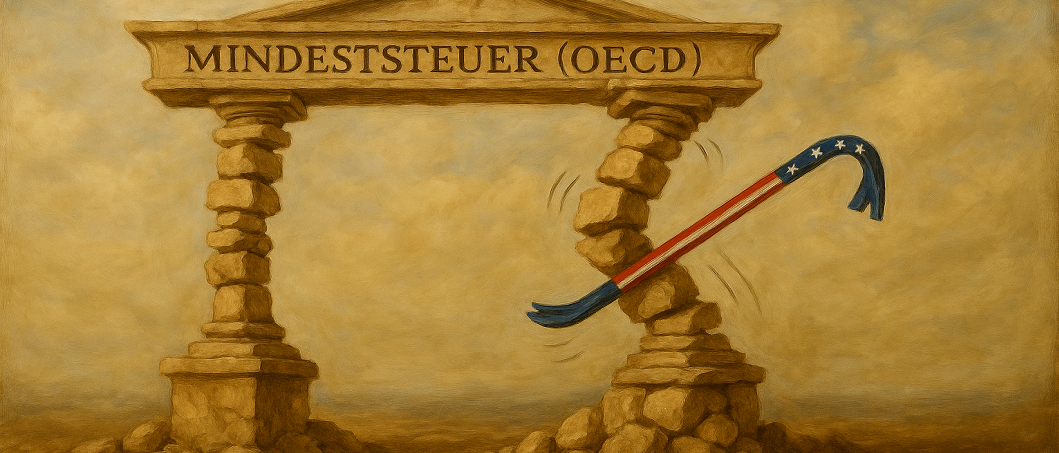COMMENT. With Section 899, the US government has secured a favorable deal for US companies and weakened the OECD minimum tax.
1. Introduction
The US government seems to have made a good deal with the “revenge tax” (Section 899). The provision is so far part of the "One Big Beautiful Bill Act", a comprehensive budget package, and provides for tax increases on income of investors and companies from “discriminatory” countries in the US. US Treasury Department determines the list of these countries. The aim is to prevent other countries from applying the OECD minimum tax to US companies. The goal appears to have been achieved. On June 26, the US Treasury Secretary announced an agreement with the G7 countries and called on Congress to remove “Section 899” from the bill.
“Section 899” had caused unrest. The consequences, however, would have been limited for investors and unclear for companies due to the law’s complexity, but probably not dramatic. Institutional stability was a greater concern: the President would have had the de facto authority to decide on the list of unfair countries, which would probably have further undermined international trust in the USA. This concern could now be a thing of the past. All in all, a good deal for the USA. It remains to be seen how and when the G7 countries will implement the agreed exemptions from the OECD minimum tax, which would be a serious blow to the long-fought-for OECD global tax deal. If the EU in particular were to reduce its taxes for US companies, this could strengthen international tax competition.
2. section 899 as a backlash against the global minimum tax
Since the turn of the millennium, digitization has given rise to new business models that are not tied to individual jurisdictions. Companies such as Google, Meta and Amazon offer digital services in countries where they are neither physically present nor resident for tax purposes. This means that profits are often booked in other countries with low tax rates. The OECD responded to this development in the 2010s with the Base Erosion and Profit Shifting (BEPS) project to curb profit shifting to low-tax countries. The aim was to ensure that corporate profits are taxed where the economic activities take place.1
As the project made slow progress, some countries introduced digital services taxes (DST). France was the first major EU country to do so in July 2019. For example, sales from online advertising on search engines such as Google or platforms such as Facebook are taxed at 3% if the providers have a turnover of more than 750 million euros and more than 25 million euros in France. This was followed by the UK (2020), Italy (2020) and Spain (2021).
In the USA, the DSTs were met with resistance because they particularly affect US companies. In 2020, the United States Trade Representative (USTR) initiated investigations under Section 301 of the Trade Act against the UK, India, Brazil and the European Union, among others.2 President Trump also threatened counter-tariffs in response to the digital tax at the time, particularly against France.3
In October 2020, the OECD presented a two-pillar model for reforming international corporate taxation in order to advance the aforementioned BEPS project and standardize the patchwork created by the different national digital taxes. Under the first pillar ("Pillar One"), multinational corporations should pay tax on their profits where their customers are based. In return, national digital taxes would be abolished.
The second pillar ("Pillar Two") provided for a global effective minimum tax rate of 15% for companies with a consolidated annual turnover of more than 750 million euros. The core of the implementation was the so-called "Undertaxed Payment Rule" (UTPR), which allows other countries to subsequently tax profits if a tax burden of less than 15% is determined in another country. If a group pays only 5% effective tax on profits in one country, other countries can use the UTPR to tax a further 10% - until the global minimum tax rate of the multinational company in question is at least 15%. The OECD regulates coordination between countries and other implementation details in the "Administrative Guidance Handbook".4
On January 20, 2025, Donald Trump's first day in office, he signed an executive order officially withdrawing the US from the OECD agreement signed by 136 countries in January 2021.5 The executive order declared the agreement to be non-binding on the US and instructed the Treasury and Commerce Departments to systematically investigate discriminatory tax practices by other countries. Section 899 incorporates the rejection of the OECD initiative into US tax law. It explicitly penalizes countries that implement the OECD's minimum tax. Hence the nickname "revenge tax".6
3. Concrete form and consequences
Section 899 is intended to apply to all non-US persons who earn income in the USA if their home country is classified as discriminatory. It will affect countries that either levy a tax on digital services or implement the second pillar of the global minimum tax - in particular the UTPR. The decision on the list of “unfair” countries will be delegated to the US Treasury Department.
The measure provides for an additional tax burden on both capital gains and corporate profits in the current House of Representatives bill. Overall, the current tax rate is to increase by five percentage points annually up to a maximum of twenty percentage points.7
In the case of capital gains, income such as dividends and interest income (normally 30 percent, often lower under double taxation agreements) is taxed. Existing exemptions on interest income from US government bonds, for example, are likely to remain in place. Realized capital gains from the sale of securities such as shares are also generally not subject to withholding tax for foreign investors. The current draft bill does not mention the elimination of these exemptions.
For investors from the affected countries, Section 899 would therefore mean a tolerable tax increase on US investments. A simple equity portfolio based on the S&P 500 has achieved an average total return of around 10.5% p.a. since 1990, including a dividend yield of around 2% p.a. Assuming a 15% withholding tax on dividends (as is currently the case for German investors thanks to a double taxation agreement), the net return was around 10.1% p.a. The net return would be around 9.7% p.a. if the withholding tax were raised to 35%. If the withholding tax were raised to 35%, the net yield would fall to around 9.7% p.a.
With regard to corporate profits, European companies in particular would be affected by Section 899, as the EU countries would most likely end up on the list of unfair countries. Around 22% of the turnover of Stoxx 600 companies comes from the US.8 However, the concentration is high: around 30 companies have a US revenue share of over 50%.9
The tax implications depend largely on the structure of the company in question. For companies with direct permanent establishments in the USA - which is rather rare - the tax burden on US profits would gradually increase from 21 to up to 41 percent: five percentage points per year after Section 899 comes into force. Companies that operate in the USA via independent subsidiaries are already subject to the so-called BEAT tax ("Base Erosion Anti-Abuse Tax"), a surcharge of 10 percent on certain intragroup payments abroad, which is intended to counteract profit shifting. Section 899 would raise this rate to 12.5 percent and at the same time remove numerous exemptions. This would affect more companies, including smaller ones, and the tax burden could increase significantly. The exact impact depends on the individual case.
4. Consequences: two scenarios
Two scenarios emerged from Section 899. First, international tax competition could be strengthened if, under pressure from domestic companies, affected countries attempt to be removed from the list of discriminatory countries by means of concessions. This has now happened even before the "One Big Beautiful Bill" was passed. On June 26, the US Treasury Secretary announced a “deal” with the G7 countries to exclude US companies from the OECD minimum tax (“pillar two”). He asked both chambers of Congress to remove Section 899 from the budget bill.10 However, suspending the laws already passed to implement Pillar 2 would appear to be difficult and time-consuming, particularly in the EU.
Second, there could have been an escalation if European countries had responded with countermeasures such as higher taxes on digital services or stricter regulation of digital services in the EU. This risk appears to be off the table for the time being, although there has been no talk of taxes on digital services (DST) in individual countries. If Section 899 is not removed from the budget and tax package after all, and there is no exemption for US companies, then European companies would suffer the most. At the same time, Europe's productivity growth could suffer, as digital innovations would become more expensive and their availability would be limited.
A broad application of Section 899, which does not seem very likely today but is still possible, would be comparable to the introduction of capital controls for the USA. Developing and emerging countries often use such controls to limit volatile portfolio flows and the destabilizing effect of rapid capital outflows. The US would use Section 899 to deter long-term foreign direct investment, which should actually be attracted by Donald Trump's tariff policy. This contradictory policy increases uncertainty and slows down growth stimuli from European direct investment in the US.
The uncertainty would be exacerbated above all by the transfer of authority to the US Treasury Department, which could classify countries as “unfair” and further taxes in other countries as discriminatory. For EU governments, this means that "deals" would have to be negotiated in a similar way to customs policy. It would therefore be a good sign from an institutional point of view if Section 899 were to be removed from the bill.
5. Conclusion
The great excitement surrounding Section 899 now seems to be over. The feared consequences for foreign companies with a large share of US-profits from countries that have introduced the OECD minimum tax have not materialized as a result of the latest “deal” between the USA and the G7 countries. Whether and when the usually inflexible EU will implement the promised exceptions to the minimum tax rules remains to be seen.
The uncertainty that would have been associated with the transfer of authority to the US president through the creation of the list of unfair countries would have further weakened international trust in the US. Overall, the Trump administration seems to have made a good deal for the US.
____________________________________
1 See Addressing the Tax Challenges of the Digital Economy, Action 1 - 2015 Final Report | OECD.
2 See DST_Initiation_Notice_June_2020.pdf.
3 See Trump Administration Threatens Tariffs After France Digital Services Tax.
4 See Global Anti-Base Erosion Model Rules (Pillar Two) | OECD
5 See The Organization for Economic Co-operation and Development (OECD) Global Tax Deal (Global Tax Deal) – The White House.
6 “The provision creates an incentive for foreign jurisdictions to remove the unfair treatment of U.S.-headquartered or otherwise U.S.-parented companies, since it ceases to apply to these entities if the country revokes its discriminatory or extraterritorial tax or if the country provides that the discriminatory or extraterritorial tax does not apply to U.S. persons and their subsidiaries.“ (S. 1760). Siehe H. Rept. 119-106, Book 2 - ONE BIG BEAUTIFUL BILL ACT.
7 The current discussions in the Senate already provide for some mitigating amendments to the House bill. However, a final version is still pending and further amendments are likely. See Senate Finance Chairman Crapo releases substitute for House-passed tax package: PwC For the current draft ot the Senate Finance Commitee, see Finance Committee Legislative Text Title VII.
8 See A world of opportunities? - RBC Wealth Management.
9 See European Equity Strategy: Section 899 — Expert Views and Market Implications.
10 See Treasury Secretary Scott Bessent on X.
Legal notice
The information contained and opinions expressed in this document reflect the views of the author at the time of publication and are subject to change without prior notice. Forward-looking statements reflect the judgement and future expectations of the author. The opinions and expectations found in this document may differ from estimations found in other documents of Flossbach von Storch SE. The above information is provided for informational purposes only and without any obligation, whether contractual or otherwise. This document does not constitute an offer to sell, purchase or subscribe to securities or other assets. The information and estimates contained herein do not constitute investment advice or any other form of recommendation. All information has been compiled with care. However, no guarantee is given as to the accuracy and completeness of information and no liability is accepted. Past performance is not a reliable indicator of future performance. All authorial rights and other rights, titles and claims (including copyrights, brands, patents, intellectual property rights and other rights) to, for and from all the information in this publication are subject, without restriction, to the applicable provisions and property rights of the registered owners. You do not acquire any rights to the contents. Copyright for contents created and published by Flossbach von Storch SE remains solely with Flossbach von Storch SE. Such content may not be reproduced or used in full or in part without the written approval of Flossbach von Storch SE.
Reprinting or making the content publicly available – in particular by including it in third-party websites – together with reproduction on data storage devices of any kind requires the prior written consent of Flossbach von Storch SE.
© 2024 Flossbach von Storch. All rights reserved.




